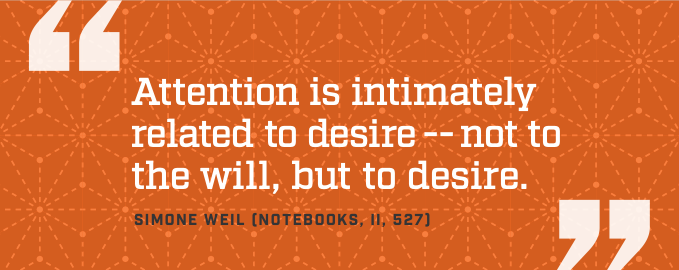
About ATTENTION
RONALD KL COLLINS
ATTENTION, a tri-monthly e-journal—launched in May 2021—is dedicated to exploring and illuminating the life and legacy of Simone Weil (1909-1943). The objective, at once practical and aspirational, is to:
- learn from Weil’s life experiences and writings in ways that clarify her thought without ignoring any possible shortcomings in that thought,
- elucidate what is ambiguous in her philosophy,
- participate in a robust Socratic dialogue with her words and ideas, and
- to reflect upon the spiritual adventure upon which she embarked—and to do all of this with a certain pensive sobriety (sophrosyne) that shuns hagiography, on the one hand, and embraces attentiveness of a higher order, on the other hand.
In short, the hope is to improve our ability to be attentive in our readings (in a Weilian sense) of the world and those in it.
To be attentive to the truth (as best as one can discern it) and to read the realities of the workings of the world (as best as one can understand them), one must be patient and receptive to whatever traces of truth we might discover. By Weil’s measure, such attention is not muscular but inquisitive; it is not forced but desired; it is humble and not narcissistic, and it is less concerned with solving problems than understanding them in all their contradictory complexities—it is Platonic, not Aristotelian, dialogic, not dogmatic.
In all of this, words matter: “Language is a means of coming to grips with the world,” is how Weil put it. To draw on one of her metaphors, language is akin to a blind person’s walking stick—it makes contact with the world possible while also providing certain meanings to that world. Language is thus a method upon which thinking depends. Hence, one must be attentive to both what is said and how it is said. That “how” is important as evidenced by what Weil wrote in Part II of The Need for Roots: “The art of transposing truths is one of the most essential and the least known. What makes it difficult is that, in order to practice it, one has to have placed oneself at the center of a truth and possessed in it in all its nakedness, behind the particular form in which it happens to have found expression.” Thus, there is the need for a “search for modes of transposition suitable for transmitting culture to the people….” By that measure, Weil’s 1936 essay on Antigone—a work written for workers at the Rosières factory—is just such a model. Take heed!
ATTENTION is the creed of the outsider, that person willing to silence the noise of the “Great Beast,” eschew the influence of the collective, rebuff the untruths of the cave (The Republic, bks. VI & VII), and all the while retaining Socratic humility. The outsider thus refuses to take refuge in subterfuge; she realizes that the illusion that fooled all saved none. To proceed thus, one must reorient oneself and perceive things from a different perch, at once pedagogical, philosophical, and spiritual. For the outsider, this reorientation embodies the very essence of existence.
To be sure, more must be said, but that is to get ahead of the very ideas (educational, political, philosophical, poetical, and spiritual) ATTENTION hopes to generate and examine. To that end, this e-journal is divided into two main categories: (i) resource materials (e.g., timelines and references and hyperlinks to books, articles, dissertations and forthcoming events, etc.) and (ii) original content (e.g., essays, book reviews, op-eds., poems, short stories, and interviews).
ATTENTION … a place where truth is tested, again and again and …



